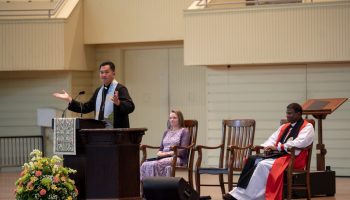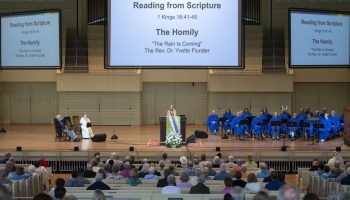
“Tenderness is a word I need to hear, and you might need it, too,” said the Rev. Mary Luti. “Something this week, last week or the week before might have put a knife in your heart, and your inner judge is mocking you when you are obviously not wrong.”
Luti was preaching at the 10:45 a.m. Sunday Ecumenical Service of Worship and Sermon in the Amphitheater. Her sermon title was “The Power of Tenderness: Rejoice with Me,” and the Scripture text was Luke 15:1-32, the parables of the lost sheep, the lost coin and the Prodigal Son and his brother.
“Tenderness is a word you might need if you checked your daughter’s phone and found out her secrets, her bad friends and the nasty things she knows about,” Luti said. “You wonder about how you fell down as a parent, and whose child is this anyway?”
Tenderness is useful when things in life don’t go as planned, Luti said. Sometimes, people think they’ve come to a dead end in life, or that they’re on a treadmill. Sometimes, it may seem like “the world will never grant your wishes and it is not the stage for all your starring roles.”
“You don’t know what to do with your disappointment, and you may think what others say is true — you are a dreamer, unfocused, you did not live your life right and you should be ashamed.”
You might need a word out on the highway when you are cut off in traffic, she told the congregation. You blow your horn, and the other driver gives you the finger.
“It was like when you had a rant with your neighbor over his lawn signs about the lies, the cruelty, leaving children to wail without parents as the sea levels rise,” Luti said.
Maybe you considered following that car but “you don’t know who has a gun today,” she said.
“It is bloody hard, and there is gratuitous violence below the surface of the most comfortable lives,” Luti said. “You need the joy of fly fishing, yoga or a good stiff drink.”
Luti talked about the tenderness in the parable of the lost sheep. The lone sheep did not wander away on purpose, but tuft by tuft of grass followed a path into the rocks and got lost.
“The last thing the sheep needed was to have someone rub his nose in his mistake,” she said. “The sheep did not need to hear that it was its own dumb fault; there were smarter sheep who deserved to be safe.”
The lost sheep needed to be found, and the good shepherd went in search of it.
“The shepherd could have cut his losses,” Luti said, “but he saw the sheep, still bleating, and took it in his arms and wrapped it around his shoulders like one of the glass-eyed stoles your grandmother wore.”
The shepherd boasted, “Look what I found — my lost sheep,” Luti said. “We need that tenderness.”
She continued, “We need to be found by the no-nonsense woman who values everything she has and refuses to concede the coin is lost until it is tucked back in the box with the leather straps and hinges where she keeps her treasures.”
The woman was not too tired from her search to invite her neighbors to come over for drinks.
The world needs tenderness like the self-centered boy, trying to be his own person, who takes his inheritance and spends it all.
“He was miserable because he did not know who he was,” Luti said. “He felt he was a pig person and that his father might take him back as a servant. He was willing to stay lost even when he was at home. The last thing he needed was for the taunting voice of shame in his ear, or his righteous older brother with moral clarity telling him he was damn lucky and to be ashamed — always and forever.”
We need to be found by a loopy parent, Luti said, “who can’t tell the difference between sincere change and self-serving excuses, who shuts us up with kisses and says, ‘Rejoice with me, look what I found, the apple of my eye, my once-dead kid.’ ”
The power of tenderness is awesome. It undermines common sense and good judgment.
“It erases all the ordinary markers of belonging,” she said, “the drive to balance the scales. When nothing else can, tenderness turns the unturnable page. We start fresh when nothing else — not a sermon, no pep talk — can make a difference. Tenderness makes treasures of us all.”
She admitted there is a such a thing as being stupid, wrong and selfish.
“We do sin and harm that causes pain in our lives and global havoc,” Luti said. “We should be ashamed and take responsibility for our aimlessness.”
Most of our sin is more haplessness than perversity, Luti said.
“Our choices are not as free as we think they are, and our motives are never clear,” she said. “We are so hungry for love we will do anything to get it.”
Because we are not ready to love and be loved, the first word must always be tenderness, before grace can be conferred.
“The church is a collection of the tender and the lost,“ Luti said. “It ministers to the blood-soaked fringes of life. It is time we exhort each other to find the lost sheep, the lost coins, the lost children — especially the children.”
The tenderness of Christ must come first.
“It must be above us and below us, to the right of us and the left of us, in front of us and behind us,” Luti said. “We can’t shape our communities without Christ’s tenderness. We must know ourselves first, last and always as loved without reason. The truth without love will crush us. Tenderness will heal us.”
Jesus shared our fragile flesh and knows how precarious goodness is. Jesus saved his harshest words for those who had no patience with the weakness of others.
“Jesus comes not to improve us, but is intent on loving us, simply loving us and seeing what love can do,” Luti said. “He comes to you here with kindness and tenderness for you.”
And Jesus knows where you are, Luti said.
“You may be a little lost,” she said, “but he knows where you are and you are safe with him. Rejoice, rejoice, rejoice.”
The Rt. Rev. V. Gene Robinson, vice president of religion and senior pastor, presided. Kaye Lindauer, who will celebrate 30 years of teaching Special Studies classes at Chautauqua in 2020, read the Scriptures. The Chautauqua Strings, 53 student musicians from Pittsburgh, played the world premiere of Aleksandr “Sasha” Voinov’s “Carry On!” This was the seventh premiere of Voinov’s music at Chautauqua. The Strings and the Chautauqua Choir were under the direction of Edward Leonard, founder and music director of the Chamber Orchestra of Pittsburgh. The hymn-anthem was “Come, Thou Fount of Every Blessing,” choral setting by Mack Wilberg. The hymn of reflection after the morning prayers was “Come and Find the Quiet Center,” attributed to Benjamin Franklin White, text by Shirley Erena Murray. The offertory anthem, with the Chautauqua Choir and the Chautauqua Strings under the direction of Leonard, was “For the Beauty of the Earth,” arranged by John Rutter. Jared Jacobsen, organist and coordinator of worship and sacred music, played the Massey Memorial Organ. The organ postlude was “God Among Us,” from La Nativité du Seigneur, by Olivier Messiaen. The Mary E. and Samuel M. Hazlett Memorial Fund provides support for this week’s services.




